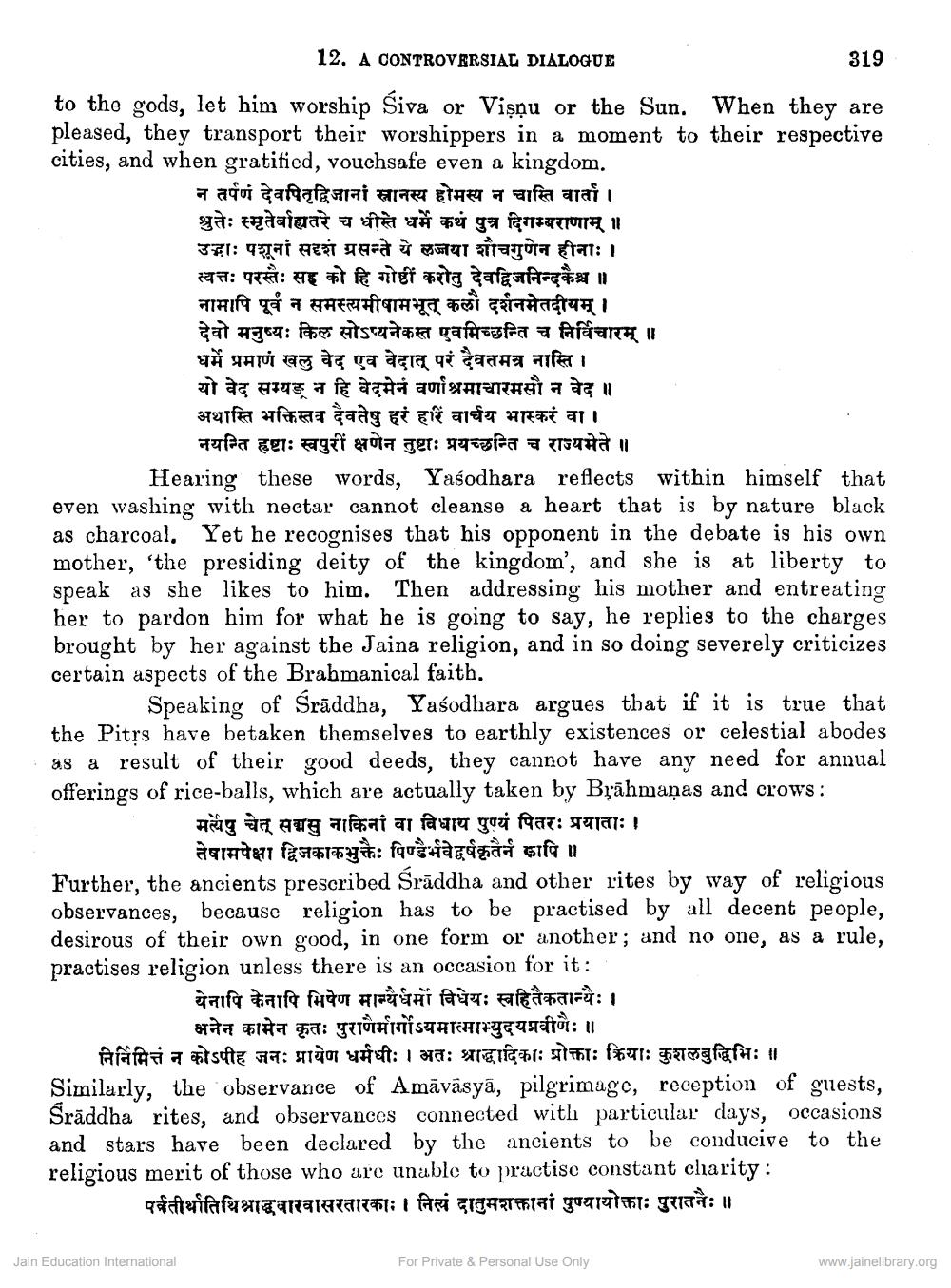________________
12. A CONTROVERSIAL DIALOGUE
319 to the gods, let him worship Siva or Vişņu or the Sun. When they are pleased, they transport their worshippers in a moment to their respective cities, and when gratitied, vouchsafe even a kingdom.
न तर्पणं देवपितृद्विजानां स्नानस्य होमस्य न चास्ति वार्ता । श्रुतेः स्मृतेबाह्यतरे च धीस्त धर्म कथं पुत्र दिगम्बराणाम् ॥ उद्भाः पशूनां सदृशं ग्रसन्ते ये लज्जया शौचगुणेन हीनाः । स्वत्तः परस्तैः सह को हि गोष्ठी करोतु देवद्विजनिन्दकैश्च ॥ नामापि पूर्व न समस्त्यमीषामभूत् कलो दर्शनमेतदीयम् । देवो मनुष्यः किल सोऽप्यनेकस्त एवमिच्छन्ति च निर्विचारम् ॥ धर्मे प्रमाणं खलु वेद एव वेदात् परं दैवतमत्र नास्ति । यो वेद सम्यड़ न हि वेदमेनं वर्णाश्रमाचारमसौ न वेद ॥ अथास्ति भक्तिस्तव दैवतेषु हरं हारे वार्चय भास्करं वा।
नयन्ति हृष्टाः स्वपुरी क्षणेन तुष्टाः प्रयच्छन्ति च राज्यमेते ॥
Hearing these words, Yasodhara reflects within himself that even washing with nectar cannot cleanse a heart that is by nature black as charcoal. Yet he recognises that his opponent in the debate is his own mother, 'the presiding deity of the kingdom', and she is at liberty to speak as she likes to him. Then addressing his mother and entreating her to pardon him for what he is going to say, he replies to the charges brought by her against the Jaina religion, and in so doing severely criticizes certain aspects of the Brahmanical faith.
Speaking of Srāddha, Yasodhara argues that if it is true that the Pitrs have betaken themselves to earthly existences or celestial abodes as a result of their good deeds, they cannot have any need for annual offerings of rice-balls, which are actually taken by Brāhmaṇas and crows :
मर्त्यपु चेत् सद्मसु नाकिनां वा विधाय पुण्यं पितरः प्रयाताः।
तेषामपेक्षा द्विजकाकभुक्तैः पिण्डैर्भवेद्वर्षकृतैर्न कापि ॥ Further, the ancients prescribed Śrāddha and other rites by way of religious observances, because religion has to be practised by all decent people, desirous of their own good, in one form or another; and no one, as a rule, practises religion unless there is an occasion for it:
येनापि केनापि मिषेण मान्यैर्धर्मो विधेयः स्वहितैकतान्यैः ।
भनेन कामेन कृतः पुराणार्गोऽयमात्माभ्युदयप्रवीणः॥ निनिमित्तं न कोऽपीह जनः प्रायेण धर्मधीः । अतः श्राद्धादिकाः प्रोक्ताः क्रियाः कुशलबुद्धिभिः ॥ Similarly, the observance of Amāvāsyā, pilgrimage, reception of guests, Srāddha rites, and observances connected with particular days, occasions and stars have been declared by the ancients to be conducive to the religious merit of those who are unable to practise constant clarity:
पर्वतीर्थातिथिश्नाद्धवारवासरतारकाः । नित्यं दातुमशक्तानां पुण्यायोक्ताः पुरातनैः ।।
Jain Education International
For Private & Personal Use Only
www.jainelibrary.org




